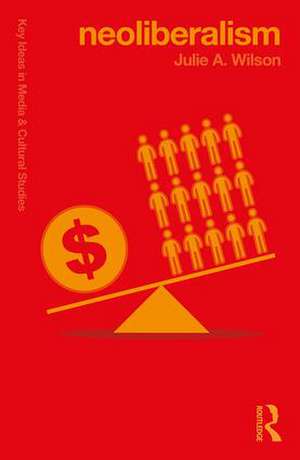Neoliberalism: Key Ideas in Media & Cultural Studies
Autor Julie Wilsonen Limba Engleză Paperback – 19 iul 2017
| Toate formatele și edițiile | Preț | Express |
|---|---|---|
| Paperback (1) | 237.37 lei 22-36 zile | +11.94 lei 6-12 zile |
| Taylor & Francis – 19 iul 2017 | 237.37 lei 22-36 zile | +11.94 lei 6-12 zile |
| Hardback (1) | 762.57 lei 43-57 zile | |
| Taylor & Francis – 27 iul 2017 | 762.57 lei 43-57 zile |
Din seria Key Ideas in Media & Cultural Studies
-
 Preț: 235.07 lei
Preț: 235.07 lei -
 Preț: 236.28 lei
Preț: 236.28 lei -
 Preț: 236.80 lei
Preț: 236.80 lei -
 Preț: 205.44 lei
Preț: 205.44 lei -
 Preț: 138.06 lei
Preț: 138.06 lei -
 Preț: 237.64 lei
Preț: 237.64 lei -
 Preț: 238.43 lei
Preț: 238.43 lei -
 Preț: 236.33 lei
Preț: 236.33 lei - 24%
 Preț: 180.20 lei
Preț: 180.20 lei -
 Preț: 266.71 lei
Preț: 266.71 lei -
 Preț: 272.92 lei
Preț: 272.92 lei
Preț: 237.37 lei
Nou
Puncte Express: 356
Preț estimativ în valută:
45.42€ • 47.54$ • 37.80£
45.42€ • 47.54$ • 37.80£
Carte disponibilă
Livrare economică 10-24 martie
Livrare express 22-28 februarie pentru 21.93 lei
Preluare comenzi: 021 569.72.76
Specificații
ISBN-13: 9781138654631
ISBN-10: 1138654639
Pagini: 256
Ilustrații: 3 Tables, black and white
Dimensiuni: 129 x 198 x 17 mm
Greutate: 0.27 kg
Ediția:1st ed
Editura: Taylor & Francis
Colecția Routledge
Seria Key Ideas in Media & Cultural Studies
Locul publicării:Oxford, United Kingdom
ISBN-10: 1138654639
Pagini: 256
Ilustrații: 3 Tables, black and white
Dimensiuni: 129 x 198 x 17 mm
Greutate: 0.27 kg
Ediția:1st ed
Editura: Taylor & Francis
Colecția Routledge
Seria Key Ideas in Media & Cultural Studies
Locul publicării:Oxford, United Kingdom
Public țintă
Postgraduate and UndergraduateCuprins
Introduction
Living in Competition
Part I: Critical Foundations
Chapter One
A New Hegemony: The Rise of Neoliberalism
Chapter Two
Neoliberal Truths and Consequences: The Four Ds
Chapter Three
The Cultural Powers of Neoliberalism: A Case Study
Part II: Neoliberal Culture
Chapter Four
The Hustle: Self-Enterprise and Neoliberal Labor
Chapter Five
The Moods of Enterprise: Neoliberal Affect and the Care of the Self
Chapter Six
Enterprising Democracy: Neoliberal Citizenship and the Privatization of Politics
Conclusion
Living in Common
Living in Competition
Part I: Critical Foundations
Chapter One
A New Hegemony: The Rise of Neoliberalism
Chapter Two
Neoliberal Truths and Consequences: The Four Ds
Chapter Three
The Cultural Powers of Neoliberalism: A Case Study
Part II: Neoliberal Culture
Chapter Four
The Hustle: Self-Enterprise and Neoliberal Labor
Chapter Five
The Moods of Enterprise: Neoliberal Affect and the Care of the Self
Chapter Six
Enterprising Democracy: Neoliberal Citizenship and the Privatization of Politics
Conclusion
Living in Common
Notă biografică
Julie A. Wilson is Associate Professor, Allegheny College, Department of Communication Arts and Theatre. She is the author (with Emily Chivers Yochim) of Mothering through Precarity: Women's Work and Digital Media.
Recenzii
"Equal parts history, analysis and manifesto, Neoliberalism dissects the competitive, free market logic that defines our era.Wilson engages a dazzling range of theory and research in a highly accessible fashion, and brings this material to life with examples from schooling, popular media culture and politics. Especially geared to youth, this remarkable textbook shows how the rising inequalities and anxieties associated with neoliberalism can be resisted."-Laurie Ouellette, University of Minnesota Twin Cities
"This book is both a brilliant intellectual intervention and a vital teaching resource. Julie Wilson shows how abstract theories of neoliberalism relate to our everyday life experiences, offering us a range of critical tools for understanding neoliberal culture and pointing to how we might construct alternatives." -Jo Littler, City University of London
"This book is both a brilliant intellectual intervention and a vital teaching resource. Julie Wilson shows how abstract theories of neoliberalism relate to our everyday life experiences, offering us a range of critical tools for understanding neoliberal culture and pointing to how we might construct alternatives." -Jo Littler, City University of London
Descriere
The book’s aim is to introduce neoliberalism in all of its social complexity, so that readers can see how neoliberalism shapes their own lives, as well as our political horizons, and thereby start to imagine and build alternative worlds.
